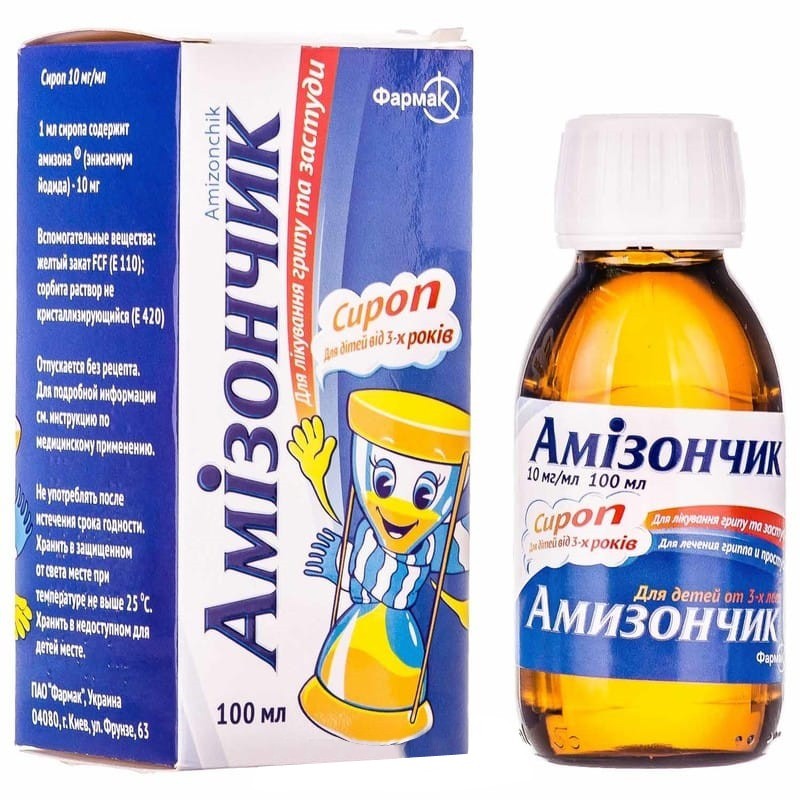



 Secure and encrypted payment processing
Secure and encrypted payment processing We ship to over 40 countries including the USA, UK, Europe, Australia and Japan
We ship to over 40 countries including the USA, UK, Europe, Australia and Japan Guaranteed refund or reship if you haven't received your order
Guaranteed refund or reship if you haven't received your orderenisamium iodide is a derivative of isonicotinic acid. It has an inhibitory effect on influenza viruses, exhibits interferonogenic properties, increases the bodys resistance to viral infections, has anti-inflammatory, antipyretic and analgesic effects.
The antiviral effect of Amizonchik is associated with its direct effect on the hemagglutinins of the influenza virus, as a result of which the virion loses its ability to attach to target cells for further replication.
The anti-inflammatory effect is the result of stabilization of cell and lysosomal membranes, slowing down the degranulation of basophils, antioxidant action, normalizing the level of prostaglandins, cyclic nucleotides and energy metabolism in the focus of inflammation. The antipyretic properties of this agent are due to the effect on the thermostatic centers of the brain. The analgesic effect of the agent is through the reticular formation of the brain stem.
Enisamium iodide enhances persistent immunity by increasing the level of endogenous interferon in blood plasma by 3-4 times, lysozyme and increasing the titer of antibodies to infectious agents, as well as cellular immunity - by stimulating the functional activity of T-lymphocytes and macrophages. This tool is a powerful inducer of endogenous interferon.
Pharmacokinetics After oral administration, Enisamium iodide quickly enters the bloodstream, Cmax observed 2–2.5 hours after administration. T½ is 13.5-14 hours. The drug is metabolized in the liver, but is rapidly excreted from the tissues (T½ = 2-3 hours). It is excreted from the body by 90–95% with urine in the form of metabolites.
Treatment for influenza and ARVI.
The drug is recommended for the treatment of children from the age of 3 years. the syrup is taken orally, preferably after a meal, with a little water.
Children aged 3-4 years - 5 ml (50 mg) 3 times a day.
Children aged 4-5 years - 6 ml (60 mg) 3 times a day.
Children aged 5-6 years - 7 ml (70 mg) 3 times a day.
For children aged 6-12 years, the drug is prescribed in the form of tablets. If the child cannot swallow the tablets, the drug should be taken 12 ml (120 mg) 2-3 times a day.
Do not exceed recommended doses.
For dosing syrup, a 5 ml dosing spoon with a division price of 1 ml is attached. If it is necessary to measure the dose above 5 ml, first measure the first 5 ml of syrup, and then the remainder of the dose.
The course of treatment is 5-7 days, depending on the severity of the disease and therapeutic effect.
Hypersensitivity to the components of the drug and iodine preparations, the presence of allergic reactions, regardless of the nature of the allergen in the anamnesis, severe organic lesions of the liver and kidneys, tuberculosis, herpetiform dermatitis of dühring (dühring-brock syndrome), manifest and latent hyperthyroidism, autonomous adenoma, focal and diffuse autonomous foci of the thyroid gland, hemorrhagic diathesis.
From the immune system: hypersensitivity reactions;
on the part of the skin and subcutaneous tissue: rash, itching, urticaria, erythema, angioedema;
from the gastrointestinal tract: dry mouth, dysgeusia (bitter taste in the mouth), swelling of the oral mucosa, hypersalivation, discoloration of the tongue (staining yellow), nausea, vomiting, diarrhea, dyspepsia, abdominal pain, upper pain abdominal distention;
from the respiratory system, chest and mediastinal organs: dyspnea, throat irritation;
from the nervous system: headache, dizziness;
general disorders and disorders at the injection site: asthenia, peripheral edema;
laboratory and instrumental data: increase in blood pressure, decrease in blood pressure.
The drug should be carefully prescribed to patients with thyroid diseases, especially those with nodular or multinodular goiter from the age of 40 years, due to the risk of decompensation of the functional autonomy of the thyroid gland (with the exception of the contraindications indicated in the section).
The syrup contains sorbitol, so patients with hereditary intolerance to certain sugars need to consult a doctor before taking this medicine. Patients with rare hereditary fructose intolerance should not take this drug.
Sorbitol can also have a mild laxative effect. The energy value of 1 g of sorbitol is 2.6 kcal.
This medicine contains a minimum daily dose (15 ml) of 1.89 mmol (or 43.5 mg) of sodium. Caution should be exercised when administering to a sodium-controlled diet.
Use during pregnancy and lactation. The use of the drug during pregnancy and lactation is contraindicated.
Children. The drug is used to treat children from the age of 3 years (see APPLICATION).
The ability to influence the reaction rate when driving vehicles or working with other mechanisms. The drug is not intended for use in this category of patients.
Amizonchik enhances the action of antibacterial and immunomodulating agents. it is advisable to combine this drug with ascorbic acid and other vitamins. patients with impaired thyroid function are not recommended to use the drug in combination with interferon.
In case of an overdose, an increase in the manifestations of adverse reactions is possible: staining of the mucous membrane in brown, vomiting, abdominal pain and diarrhea. possible development of edema, erythema, acne-like and bullous rashes, fever.
Treatment: gastric lavage, symptomatic treatment.
In the original packaging at a temperature not exceeding 25 ° C.